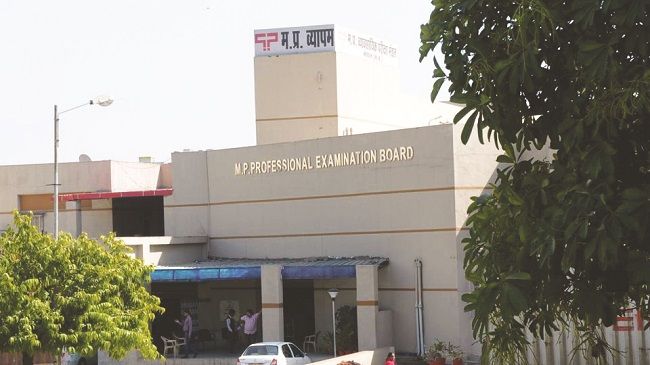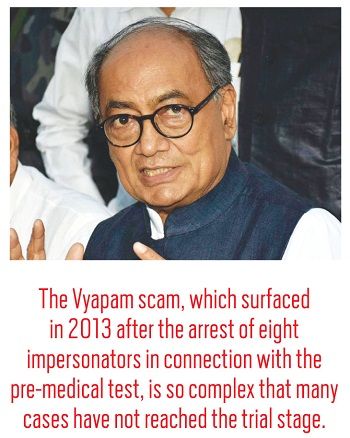
India’s biggest jobs-cum-admissions racket takes another U-turn in what is becoming a legal and investigative jigsaw puzzle
~By Rakesh Dixit
Corruption scandals in India, especially those involving powerful politicians, have a tendency to spring major legal surprises. The Vyapam scandal is a prime example. In June-July 2015, the Vyapam scam caused a nationwide furore as the media prominently reported 40-odd suspicious deaths related to the India’s biggest jobs-cum-admissions racket. Also, allegations of Madhya Pradesh Chief Minister Shivraj Singh Chouhan’s direct complicity added to the sensation around the multi-layered fraud. He was accused of tampering with electronic evidence. Taking cognisance of both factors, the Supreme Court on July 9, 2015, ordered the Central Bureau of Investigation (CBI) to take over the probe into the scam from the Madhya Pradesh government-controlled Special Task Force. Vyapam is a Hindi abbreviation of the Madhya Pradesh Professional Examination Board (MPPEB).
On October 31, the CBI absolved the chief minister of involvement in the evidence-tampering case, saying “there was no grain of truth in the allegations”. The agency said it had submitted a status report to the Supreme Court holding that the allegations were untrue. It attached seven reports from the Central Forensic Science Laboratory (CFSL), Hyderabad, and other evidence collected during investigation. The MP High Court had already dismissed the tampering allegations as baseless. When the CBI took over the probe, the petitioners urged the court to have the evidence reexamined. The agency agreed to do so.

The original allegation, made by Congess leader Digvijaya Singh, had stated that a hard disk seized in the Vyapam case had been tampered with to remove the chief minister’s name. The allegation was that the hard disk, seized from Vyapam official Nitin Mahindra, main accused in the scam, had been doctored to replace “CM” with “M/S”, in an attempt to save Chouhan in the case.
Singh’s allegation was based on a mirror copy of the seized hard disk which whistleblower Prashant Pandey had procured. Pandey, a cyber expert, had been roped in by the MP police to crack Mahindra’s computer to get information contained in the hard disk. Later, he fell out with the police and joined hands with Singh in filing the petition for a CBI probe into the scam in the Supreme Court. Mahindra, then principal systems analyst in the MPPEB, is alleged to have listed the names of influential persons linked to the case on his computer in Excel files. On July 18, 2013, the Indore police seized his computer and hard disk. The investigation was handed over to the Madhya Pradesh Police Special Task Force and later to the CBI.
Ruling out tampering with the hard disk seized from Mahindra by the Indore police on July 18, 2013, the CBI said it was last switched off on July 15, 2013, and its records were not accessed thereafter. All the five Excel files with the references to “CM’’ were created or modified after July 18, 2013, it said. The agency intends to take action against Singh and Pandey on the charge of tampering with evidence.
 The CBI clean chit, however, does not mean the chief minister is out of the woods. The Congress has planned to challenge the agency’s report in the special court in Indore. The country’s top three lawyers—Kapil Sibal, KTS Tulsi and Vivek Tankha—have said their clients stand by the tampering allegation and will “expose the CBI’s lies” in the court. The lawyers contend that two pen drives submitted to the agency by the whistleblower—one purportedly containing the original files created by Mahindra and the other the tampered-with files—support their allegation. The CBI has sent the pen drives, too, for forensic examination and the result is awaited.
The CBI clean chit, however, does not mean the chief minister is out of the woods. The Congress has planned to challenge the agency’s report in the special court in Indore. The country’s top three lawyers—Kapil Sibal, KTS Tulsi and Vivek Tankha—have said their clients stand by the tampering allegation and will “expose the CBI’s lies” in the court. The lawyers contend that two pen drives submitted to the agency by the whistleblower—one purportedly containing the original files created by Mahindra and the other the tampered-with files—support their allegation. The CBI has sent the pen drives, too, for forensic examination and the result is awaited.
Whatever the court might decide in future, Chouhan and his party are jubilant over the CBI report. “I was clean, so clean chit was only to be expected,” Chouhan reacted to the report, adding the Congress’ malicious propaganda against him is now exposed. The BJP celebrated the report by felicitating the chief minister. The Congress, on the other hand, is crying foul.
The Congress had faced similar embarrassment when the CBI filed a closure report early last month in 24 deaths related to Vyapam. Of the 40-odd suspicious Vyapam-related deaths, the CBI investigated 24. Its investigation revealed that, of them, 16 had taken place much before the deceased were booked in the scam by the state police. The bureau ruled out any conspiracy behind the deaths. The remaining deaths were due to natural causes, it said.
The clean chit to the CM and the closure report in the allegedly suspect deaths are two significant, if controversial, milestones in the progress of the CBI investigation. But the agency still has a long and arduous task to finish before chargesheets are presented in various courts in the Vyapam case.
In December last year, then solicitor-general Ranjit Kumar had told the Supreme Court that pre-trial investigation had been completed in 117 cases and was pending in another 38 cases. “Over 2,147 people, including 988 witnesses and 1,100 accused, have been examined by the agency,” Kumar told the court. Over 20 courts in Madhya Pradesh are hearing cases related to the scam. The CBI has registered 154 FIRs in connection with the alleged corruption cases which are at various stages of investigation or trial.
During the hearing, the Supreme Court had said it would no longer monitor the Vyapam scam as special courts have begun trial in related cases. The CBI filed its latest chargesheet on October 31 against 490 accused, including three Vyapam officials, three racketeers, 17 middlemen, 297 candidates (including “solver” and “beneficiary” students) and 170 guardians in a special court in Bhopal, in the case related to irregularities in the pre-medical test (PMT) conducted in 2013.
The CBI chargesheet said medical college students or bright medical aspirants taking coaching in MP, Uttar Pradesh, Bihar, Delhi, Rajasthan and Maharashtra were among the “solvers”. To track them, the agency said it prepared a database of over 10 lakh students by collecting details of students of medical colleges and coaching institutes in these states. Using advanced software to identify facial features, the CBI then matched the photographs in the admit card records to identify the “solvers”. The CBI said it managed to identify 42 “solvers”.
The Vyapam scam, which surfaced in July 2013 after the arrest of eight impersonators in connection with the PMT, is so complex and multi-layered that many cases have not even reached trial stage. Before the CBI took over the probe, the state’s special task force had arrested over 2,000 suspects including students, parents, politicians, bureaucrats, education mafia and middlemen. A majority of them, particularly the influential ones, are on bail.

